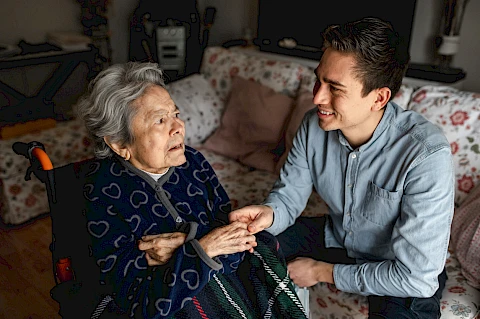
Neurocognitive impairment is a leading global cause of dementia that affects millions of families. As World Alzheimer's Month starts this September, it's a time to bring attention to and offer assistance to those impacted by the illness. With this in mind, Senior Helpers is dedicated to equipping Alzheimer's caregivers with practical guidance and resources to help them tackle the demands of caregiving.
What Is Alzheimer's Disease?
Alzheimer's Disease (AD) is a progressive brain disorder that gradually impairs recollection, thinking, and behavior, affecting daily life. Early symptoms include mild memory loss, difficulty recognizing faces or finding words, and disorientation. Recognizing these early signs is crucial for timely diagnosis and management.
Effective Communication Tips
Alzheimer's caregivers must emphasize patience and understanding to enhance communication strategies. Bear in mind these strategies to improve interactions:
- Utilize simple language and clear instructions, avoiding complex terms.
- Rely on facial expressions, gestures, and eye contact for added clarity.
- Maintain patience and composure, prepared to repeat yourself if necessary.
- Refrain from correcting or arguing; instead, attempt to grasp their perspective and prioritize emotion.
- Use humor and provide positive feedback to foster connection and bolster self-esteem.
Daily Care Strategies
Carers of those with major neurocognitive disorders play a crucial role in supporting individuals with the condition. Providing a safe and structured environment is essential for their well-being. Here are some daily care strategies to consider:
- Consistent mealtimes, bedtime routines, and daily activities can help individuals with Alzheimer's feel more grounded and secure.
- Remove tripping hazards, install bathroom grab bars, and ensure good lighting to prevent accidents.
- Remain calm and offer reassurance during times of confusion or agitation. Avoid arguing or correcting them, as this can escalate their distress. Instead, try to understand their perspective and provide gentle guidance.
Self-Care for Family Guardians
Caregiving can be physically and emotionally demanding. Caretakers need to prioritize their well-being to prevent burnout. Here are some self-care strategies:
- Be aware of the symptoms of caregiver burnout, such as exhaustion, irritability, and a lack of interest in activities.
- Schedule breaks throughout the day to rest and recharge.
- Spend time doing things you enjoy and socializing with friends and loved ones.
- Join a support group or talk to a therapist for additional guidance and emotional support.
Are You Caring for a Loved One With Alzheimer’s?
Caring for a loved one with neurocognitive disorders can be challenging, but you're not alone. Learning about the illness and how to take time for yourself as Alzheimer's caregivers can make a big difference.
If you need professional caregiving services in Philadelphia, Bala Cynwyd, Chestnut Hill, Narberth, and Montgomery County, contact us at Senior Helpers Chestnut Hill. We're here to help you provide the best care for your loved one.